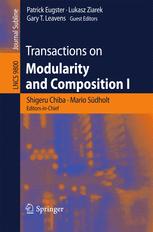

Most ebook files are in PDF format, so you can easily read them using various software such as Foxit Reader or directly on the Google Chrome browser.
Some ebook files are released by publishers in other formats such as .awz, .mobi, .epub, .fb2, etc. You may need to install specific software to read these formats on mobile/PC, such as Calibre.
Please read the tutorial at this link: https://ebookbell.com/faq
We offer FREE conversion to the popular formats you request; however, this may take some time. Therefore, right after payment, please email us, and we will try to provide the service as quickly as possible.
For some exceptional file formats or broken links (if any), please refrain from opening any disputes. Instead, email us first, and we will try to assist within a maximum of 6 hours.
EbookBell Team

4.1
10 reviewsThe LNCS Transactions on Modularity and Composition are devoted to all aspects of software modularity and composition methods, tools, and techniques, covering requirement analysis, design, implementation, maintenance, and evolution. The focus of the journal also includes modelling techniques, new paradigms and languages, development tools, measurement, novel verification and testing approaches, theoretical foundations, and understanding interactions between modularity and composition.
This, the first issue of the Transactions on Modularity and Composition, consists of two sections. The first one, guest edited by Patrick Eugster, Mario Südholt, and Lukasz Ziarek, is entitled “Aspects, Events, and Modularity” and includes papers focusing on context-oriented software development, specifications for even-based systems, and development of modular software. The second section, guest edited by Gary T. Leavens, contains journal versions of selected papers from Modularity 2015, which was held in March 2015, in Fort Collins, Colorado, USA. Topics covered by the papers in this section include software unbundling, layer activation in context-oriented programming, modular reasoning in event-based languages, and dynamic dispatch for method contracts using abstract predicates.